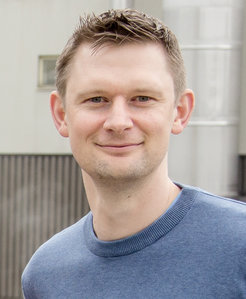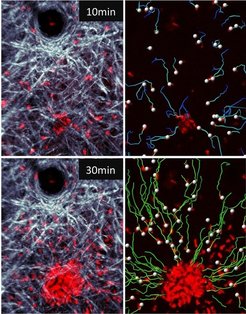Tim Lämmermann awarded prestigious ERC Starting Grant in 2016
Tim Lämmermann, group leader at the Max Planck Institute of Immunobiology and Epigenetics, Freiburg (MPI-IE), is to receive a European Research Council (ERC) Starting Grant in 2016. With Starting Grants the ERC honors selected and excellent young scientists all over Europe. The funding should enable them to build up their research groups and carry out independent ground breaking research.

Tim Lämmermann, since 2015 group leader at the MPI-IE, is investigating innate immune cells and how they interact with each other to shape an effective immune response in inflamed and infected tissues. Although a lot of different immune cell types, their functions as well as signal substances have already been characterized, it is in many cases still unknown how exactly immune cells coordinate themselves in inflamed tissues to prevent the spread of invading pathogens. Now the immunologist has received one of the highly coveted ERC Starting Grants by the European Research Council to pursue his research on inter- and intracellular immune cell dynamics at the MPI-IE in Freiburg.
“Since my doctoral studies I’ve been fascinated by this special field of research and it is surprising that we still know so little about the dynamics and coordination of different immune cell types at sites of tissue inflammation”, says Tim Lämmermann.
During his postdoctoral time at the National Institutes of Health in the United States, Tim Lämmermann studied so-called “neutrophils”, which are essential immune cells that can engulf and eliminate pathogens at sites of tissue injury and infection. He made the unexpected finding that neutrophils communicate with each other to form very coordinated and self-organized cell swarms, which allows neutrophils to jointly fight invading pathogens during infection (see Fig 2).

Based on his previous work, he and his team in Freiburg have now started to investigate in more detail the mechanisms behind the formation of neutrophil swarms and explore their role in inflammatory and infectious diseases. “Not only neutrophils, but also other immune cells show swarm-like behaviour. Our current work tries to understand the fundamental principles of immune cell swarms and their functional role for immune responses”, says Tim Lämmermann.
The ERC funding for his proposal “Innate immune cell swarms – Integrating and Adapting Single Cell and Population Dynamics in Inflamed and Infected Tissues” provides Dr Lämmermann and his team the great opportunity to discover the basic mechanisms of immune cell swarming. The novel findings from these studies hold great promise to open new avenues for the therapeutic modulation of immune responses under conditions of inflammation and infection.
ERC Starting Grants
ERC Starting Grants are awarded annually to Europe’s top researchers to carry out their research at an institution in Europe. The funding is provided by the European Research Council (ERC) to excellent young scientists of all nationalities who have between two and seven years scientific experience after receiving their Ph.D. In 2016, 325 young European researchers received funding by the ERC, which is an overall success rate of approx. 11%. The Max Planck Society (MPG) was the most successful institution in Germany in this third round of applications. Thirteen ERC Starting Grants went to scientists of the MPG, thereof four were received by scientists of the life sciences. They will each receive up to 1.5 million euros for their research projects.
The ERC funding for Tim Lämmermann again confirms the status of the Max Planck Institute of Immunobiology and Epigenetics, Freiburg as a location for European top-level research. It is the seventh ERC award for scienstists of the institute after two ERC Advanced Grants for Thomas Boehm and Michael Reth in 2012, three ERC Starting Grants for Robert Schneider (2007), Andrew Pospisilik (2011) as well as Patrick Heun (2012) and an ERC Consolidator Grant for Andrew Pospisilik in 2015.
CV
Tim Lämmermann studied Molecular Medicine at the Friedrich-Alexander-University, Erlangen-Nurnberg, Germany and the Lund University, Sweden from 1999 till 2004. He performed his doctoral studies at the Max Planck Institute of Biochemistry in Martinsried, Germany, and received his doctoral degree from the Ludwig-Maximilians Universität München in 2009. His doctoral thesis on “The role of integrins and cytoskeletal forces in interstitial leukocyte migration“ (2009) was awarded with the Otto-Westphal-Promotionspreis by the German Society for Immunology (DGfI). Following his doctoral studies, he took a Post-Doc position at the National Institute of Allergy and Infectious Diseases in Bethesda, USA. There he worked on the mechanisms of neutrophil swarming during infection and disease in the laboratory of Systems Biology. The Robert Koch Foundation recognized this work and awarded it with the Robert-Koch Postdoctoral Award 2014. Since January 2015 Tim Lämmermann is group leader of the Max Planck Research Group “Immune Cell Dynamics” at the Max Planck Institute of Immunobiology and Epigenetics in Freiburg, Germany.













